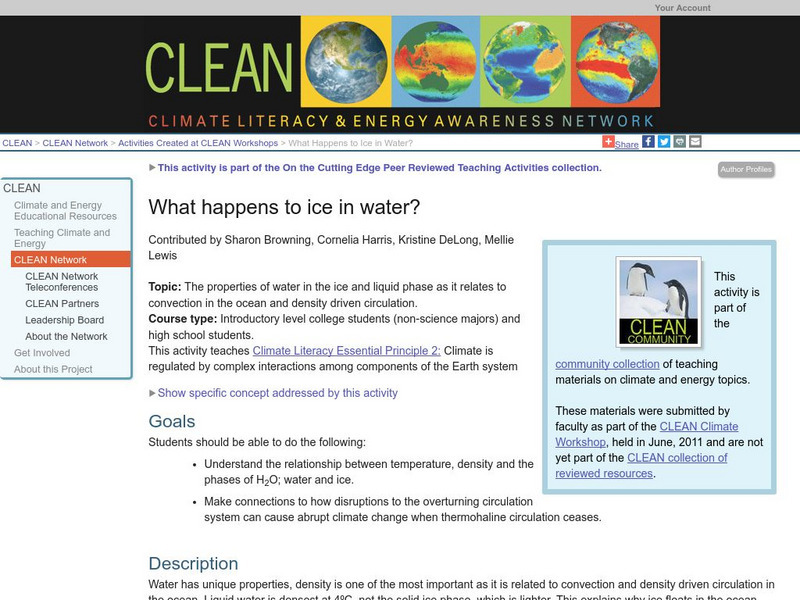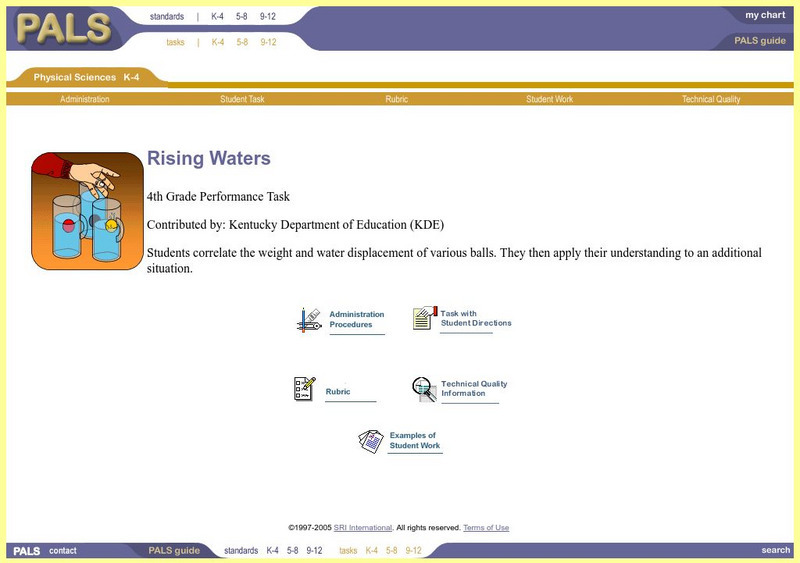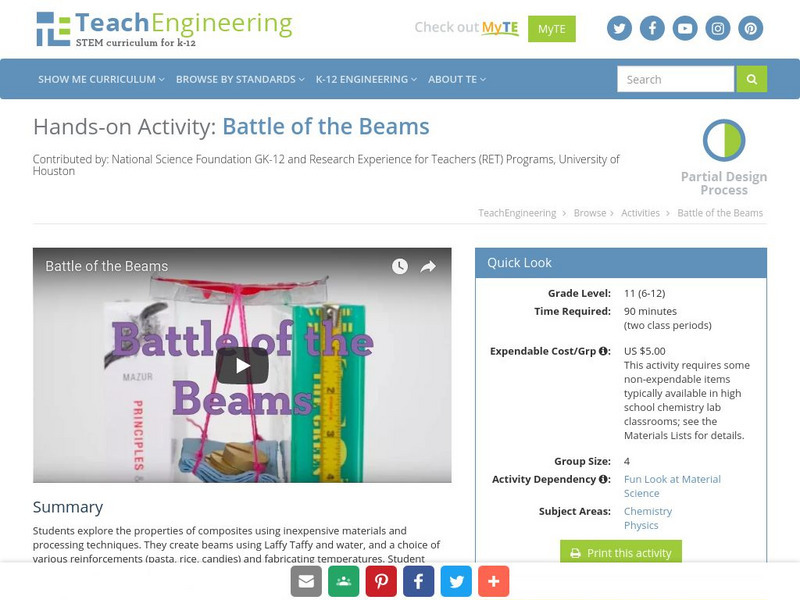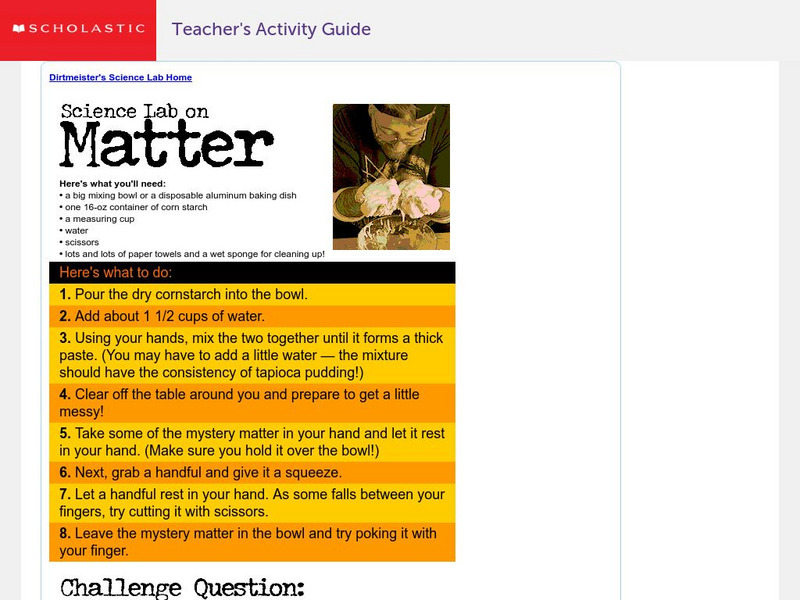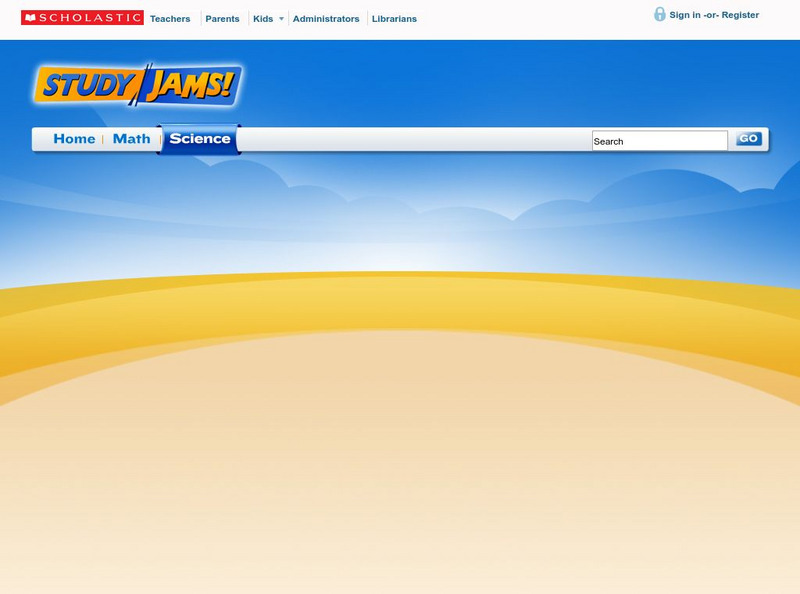Hi, what do you want to do?
Khan Academy
Khan Academy: Biology: Water, Acids, and Bases: Solvent Properties of Water
An article investigating why water makes a good solvent. Also, understand what molecules dissolve best in water.
CK-12 Foundation
Ck 12: Earth Science: States of Water
[Free Registration/Login may be required to access all resource tools.] Describes the three states of matter of water.
CK-12 Foundation
Ck 12: Earth Science: States of Water
[Free Registration/Login may be required to access all resource tools.] Describes the three states of matter of water.
American Geosciences Institute
American Geosciences Institute: Earth Science Week: Properties of Fresh Water and Sea Water
Students set up three demonstrations to observe the properties of water. They explore the boiling point of water, the freezing point of water, and the ability of water to store heat.
TED Talks
Ted: Ted Ed: Why Does Ice Float in Water?
Ever wonder why solid ice floats in liquid water? In this video lecture you will explore the special properties of water. Learn "the science behind how hydrogen bonds keep the ice in your glass (and the polar ice caps) afloat". At the...
TOPS Learning Systems
Tops Learning Systems: Top Science: Conduction and Convection [Pdf]
Experiment investigating conduction and convection of heat in water.
American Chemical Society
American Chemical Society: Best of Wonder Science: Air: It's Really There [Pdf]
An experiment to explore the properties of air, using a cup placed upsidedown in water.
Climate Literacy
Clean: What Happens to Ice in Water?
Young scholars investigate the properties of water in the ice and liquid phase as it relates to convection in the ocean and density driven circulation, and ultimately the climate.
US Geological Survey
Water Properties
This site provides a discussion of the physical properties of water. Click Home to access the site in Spanish.
SRI International
Performance Assessment Links in Science: Rising Waters
A unique approach to determining size and weight of an object through water displacement: students are presented with a scenario along with a variety of balls made of different materials and pitchers of water. Working in small groups,...
TeachEngineering
Teach Engineering: Battle of the Beams
Students explore the properties of composites using inexpensive materials and processing techniques. They create beams using Laffy Taffy and water, and a choice of various reinforcements (pasta, rice, candies) and fabricating...
American Chemical Society
American Chemical Society: Best of Wonder Science: Ice of a Different Color [Pdf]
An experiment to test what happens to water when salt or sugar is added and it is then frozen into ice cubes. Students also explore the ice's physical properties by rubbing cubes on sandpaper and dropping a heavy object on each type.
Scholastic
Scholastic: Dirtmeister's Science Lab: Matter
Students will use water and cornstarch to make a mystery matter, and then discuss what happens when different energy is applied.
Scholastic
Scholastic: Study Jams! Science: Ecosystems: Water Cycle
Watch an animated video on the water cycle, become familiar with related vocabulary terms, and then quiz yourself on the parts of the water cycle, and review your answers when you're done. Site includes guidelines for a lesson entitled...
TOPS Learning Systems
Tops Learning Systems: Top Science: Water Domes [Pdf]
Investigate the cohesive tension on the surface of water.
Other
Science Alive: Melting Point Simulation
Percy Julian and Josef Pikl used the fact that melting point-the temperature at which a substance changes from a solid to a liquid-is a characteristic property of a substance to prove that the British chemist Robert Robinson could not...
BBC
Bb Ci Schools: Revisewise Science: Solids, Liquids, Gases
This site contains an interactive activity in which students can learn about the three states of matter. There is also a factsheet that lists numerous properties of liquids, solids, and gases. The factsheet also uses water as an example...
Math Science Nucleus
Math/science Nucleus: Nu, You, and Water Animation
This animation discusses water and its properties in a storybook format. An emphasis is placed on filtration and purification of water.
US Geological Survey
Usgs: Arsenic in Ground Water in the United States
This page discusses the presence of arsenic (chemical symbol As) in ground water in the United States. Also provides many links to other sites about arsenic (especially in drinking water.)
Other
The Science House: Production of Hydrogen
In this experiment, students generate hydrogen gas and examine its properties. Teacher's notes are included.
Science Fun for Everyone
Science Fun: Olympic Medals
Create your own Olympic medal out of clay with the help of an adult. Watch as your design hardens over time as the water in the clay evaporates.
Center of Science and Industry
Cosi Columbus: Coffee Filter Rainbows
Science experiment that demonstrates chromotography. Includes full list of materials, procedures, and scientific explanation of what happens with different colors when they are soaked with water.
Science Education Resource Center at Carleton College
Serc: Mn Step: Sponge Lab: Experimenting With Absorption
Students investigate the properties of synthetic and natural sponges in this activity, to determine the capacity of each to absorb water. Afterward, they discuss other questions they have about sponges, and complete an assessment in...






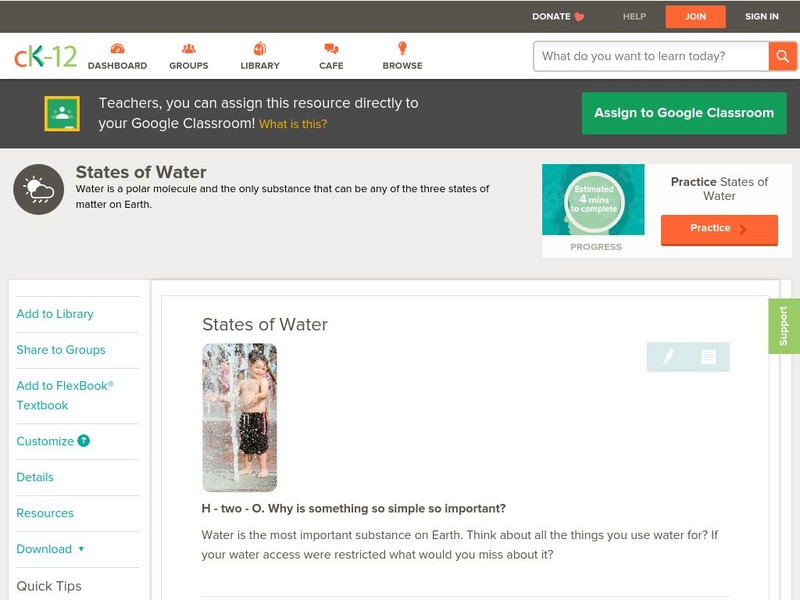

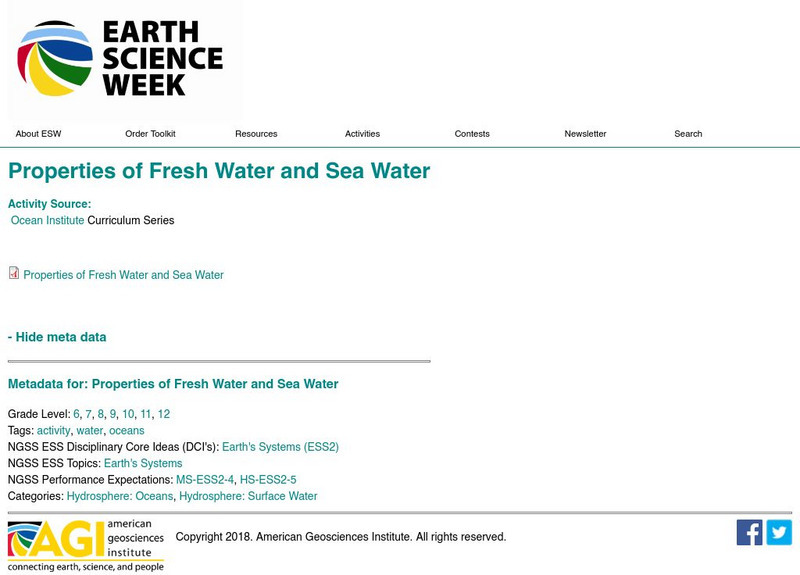

![Tops Learning Systems: Top Science: Conduction and Convection [Pdf] Activity Tops Learning Systems: Top Science: Conduction and Convection [Pdf] Activity](https://static.lp.lexp.cloud/images/attachment_defaults/resource/large/FPO-knovation.png)
